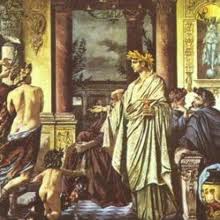5 Ancient Greek Concepts that
Our Culture Really Needs
A little aside before we dive into today’s entertainment –
I haven’t posted lately, due to a severe case of Autolysis, but have some great things in the works, behind the scenes. Be on the lookout for newness coming forth.
Sign up on my email list for periodic updates & inside deals, if you’re curious.
In the meantime….

Ancient Greece is generally thought of as the birthplace of philosophy, democracy and Western culture, but the ancients had many ideas related to both human nature and politics that our culture has no concept for. For one thing, the ancients believed that the individual and the state were inextricably linked, that as Plato put it, the state is merely “man writ large.”
From here, the problems of politics are seen as comparable to the same psychological hazards faced by every individual. According to Plato, a delicate balance between the mind, body and spirit is the cure for individual dysfunction, and a delicate balance of rulers, workers and military is the cure for political dysfunction, where each performs its own function, without trying to take over the proper functioning of another part of society or self.
Our own culture makes a sharp distinction between the self and the state. Low voter turnout and dwindling civic participation are signs of a public alienated from its state. The United States military-industrial complex eats up most of our nation's GDP, and has its fingers in every other nation's pies, around the world. Billions of dollars go into "black ops" that the American people have no knowledge of. Most do not realize that it was the USA's own military that trained and armed the likes of Saddam Hussein, Al Qaida and ISIS. Policies like Citizens United, which allows corporations to make unlimited political donations, have corrupted whatever sense of civic honest was left in America.
What would our culture be like if we had not turned our government over to career politicians, corporations and lawyers?
Here are a few other useful ideas that the Ancient Greeks utilized, that we have no words or social concepts for.
Telos is the belief that humans have a definite goal and purpose in life that is characteristically human. This belief holds that all of society should be set up so as to assist people in discovering and achieving their personal telos.
Religions typically also have a telos, often involving some kind of eschatological final battle. Fundamental Christianity and Fundamental Islam both share the belief in Armageddon. Both welcome the idea of a Final Reckoning that entails the destruction of the majority of humanity (non-believers) and the world. Both radical Christianity and radical Islam followers believe that time is linear, with a definite beginning and ending.
The ancient Greeks did not share this belief. The Greek believed that the universe is cyclic in nature, so the ending of one age was the beginning of the next. In the Greek view then, telos is about finding harmony and balance whilst fully expressing one's creativity and unique genius.
Eudaemonia is the target of the
telos. It is most often translated as “happiness,” but a better word would be
flourishing, as the Greek ideal implied a person functioning at their personal
best and living an excellent life. This was the purpose and gave meaning to
human life in ancient Athens. I like to think of it as living in the Flow, being "in the zone," as much as possible.
Greek culture provided the space for citizens to explore and achieve this condition of Eudaemonia. And look at the results: We still look to them as role models in a number of fields, including philosophy, architecture, drama, mathematics... the list goes on.
In our culture, this idea is so rare that we don't even have a term for it.
Hubris is extreme arrogance or
pride, and is one of the worst vices. It is always the cause of tragedy in
ancient dramas, and is the tragic flaw of many heroes. It is always punished by
the gods.
The ancients hated extremes and strove for balance, harmony, excellence and beauty. They intentionally set up their society to create excellent and happy citizens capable of governing themselves, believing this would create an excellent and happy society. We still marvel at their political theory, art, drama, and architecture, the depth of their thought and the surprisingly scientific understanding of some of their philosophers.
There are many people and institutions in our culture that have expressed hubris. Our political leaders, as well as our captains of industry have displayed extreme arrogance when they have ignored the will and welfare of the people and the planet. Problem is, hubris is ALWAYS punished, and often the offender is not the only one to suffer. Collateral damage is common in Greek tragedy.
Arête is often translated as
excellence or valor. It originated to describe courage in battle, but was
expanded to mean all types of human excellence, which were believed to be
interdependent. In fact, all the virtues were believed to be interconnected. It
is through practicing Arête that you achieve Eudaemonia.
Our culture has become accustomed to mediocrity. We rarely give our best effort. We have become a culture that does the bare minimum required to get by, hoping to fly under the radar, rather than to stand out. Oh, we still give lip service to excellence - we expect others to give their best effort, but rarely do it ourselves... unless it is for a price.
Pleonexia means over-reaching
ambition or greed. This is also a serious vice punished harshly by the gods.
We can see a lot of pleonexia in the world around us, whether it be the 1% that the Occupy Movement futilely raged against, or monopolizing corporations, such as the vast majority of all news outlets being concentrated into 4 companies, whose owners have ties to oil and energy giant, or the domination of food production in the hands of a few mega-corps. We see it in governmental over-reach, where more and more of our lives come under government scrutiny and control. We see it in our monetary system, whose influence over congress has cost taxpayers billions of dollars and has essentially ended democracy in the United States of America.
The two guiding principles of the ancient Greeks were: Know Thyself and All Things in Moderation. This is the system that the Founding Fathers used as a model in creating the United States, but is mostly forgotten now.
As individuals, we are alienated from ourselves, as well as disaffected from our government. As our culture actively discourages introspection and distrusts intuition, our culture fills in the blanks with the latest gizmos, fad diets, self-help and get-rich-quick schemes. Kept in a constant state of longing and coveting by advertising, we despise what we are. As a people, we are so mixed up, we don't know if we are coming or going. We are being cleverly manipulated to be so busy and confused that we have no idea who we are or what our actual situation is.
Our culture does not value moderation. We want extremes, ultra-radical-mega-pumped super-sized extremes. We are so polarized that we have no idea what moderation even means any more. Temperance sounds boring to us, as we seek to push all limits. Problem is, if everything is maxxed out, then not only can we not appreciate subtleties, but we also cannot see just how far out on the limb we really are.
According to ancient Greek sensibilities, we are a culture dangerously out of balance and out of touch with the wellsprings of our inspiration. It could
benefit us all to rediscover some of these ancient Greek concepts now.
(Adapted from my essay, Ancient Greek Concepts)

Return to
Province Of The Mind
Sign up to receive special offers, news and interesting tidbits for your mind!
Recent Blogs
from Dara
May 2015
March 2015
Ancient Greek Concepts Our Culture Really Needs
December 2014
Subjective Reality in a Holographic Universe
November 2014
August 2014
GrailChase Book 2 Coming Soon!
Tapping Into Your Own Subjective Reality
Depression, Conspiracy Theory & Waking Up
July 2014
March 2014
February 2014
Getting on My Philosophy Soapbox
Subjective Explorations in Application



New! Comments
Have your say about what you just read! Leave a comment in the box below.